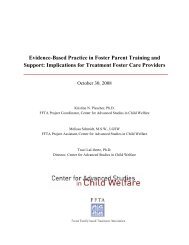Independent Living Program - Florida's Center for Child Welfare
Independent Living Program - Florida's Center for Child Welfare
Independent Living Program - Florida's Center for Child Welfare
- No tags were found...
You also want an ePaper? Increase the reach of your titles
YUMPU automatically turns print PDFs into web optimized ePapers that Google loves.
Support Services: Young adults who opt in to intensive services will have access to housingand an array of support services based on their transition plan. The services available include,but are not limited to, the following:- Mentoring and tutoring;- Mental health services and substance abuse counseling;- Life skills classes, including credit management and preventive health activities;- Parenting classes;- Job and career skills training;- Counselor consultations;- Temporary financial assistance; and- Financial literacy skills training.Housing/Placement Options: Eligible young adults that continue to receive intensive supportsand services will have access to an array of placement options that include graduated levels ofsupervision. The most appropriate setting <strong>for</strong> a young adult will be determined through thecase planning process and the transition planning process. Florida Statutes require activeyouth involvement in the process.All eligible young adults who opt to continue to receive supports and services will be eligible <strong>for</strong>“Tier 1” housing, in which payments will be made directly to the housing provider. Potential“Tier 1” settings may include:- Foster homes- Group homes- Scattered site apartments- Supervised apartmentsEligible young adults who have demonstrated high levels of independence and who havereceived a high school diploma or equivalent are eligible <strong>for</strong> direct stipends <strong>for</strong> housing, inwhich payments will be made directly to young people rather than to providers. 12 Decisionsregarding whether a young adult is prepared to manage a direct stipend will be determined withthe young adult in the case planning process. In addition to judicial proceedings, young adultswhose request <strong>for</strong> a stipend was denied will have access to a Fair Hearing in order to appealthe decision.Court Reviews: The cases of young adults who choose to receive supports and services willhave two court reviews per year, one of which will be a Permanency Hearing. 13 A copy of thecurrent Transition Plan must be filed with the court in advance of hearings. Any partyassociated with the case may file a progress report regarding the Transition Plan, but theservice provider is required to file a progress report.Bridge Supports and ServicesYoung adults who exit state custody from licensed foster care, relative custody, or unlicensed careat age 18, including cross-system youth, who do not meet criteria or opt out of continued supportservices will have access bridge supports. Bridge supports include access to an independentliving resource person who will provide in<strong>for</strong>mation and referral services upon request, supportservices and limited cash assistance as follows:12 Stipend amounts will follow the same rates as current RTI placements. Specific criteria regarding who is eligible toreceive stipends must be determined in more detail.13 If conducting two court reviews annually is cost-prohibitive, the subcommittee recommends that Florida exploreimplementing an Administrative Review process that could be conducted once per year along with a PermanencyHearing.The Finance Project 6
















